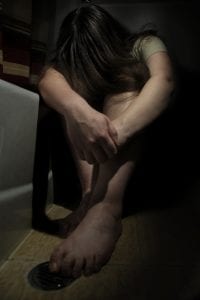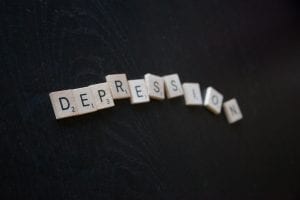Hi there. Did you click on this link because the title stirs something in you? Was there a moment in your life where someone didn’t believe you? I do. I promise. I just wanted to get that out of the way before I tell you my story. Seriously, I do.
Drama Queen
When I was a girl, I wanted to be on the stage. I was sensible enough in those years to recognize I had a slightly above-par singing voice and an awkward yet tolerable stage-presence, so the theater wasn’t going to ever be my endgame. Still, I reveled in the moments I spent under a make-shift high school spotlight crooning Hard Candy Christmas. At the end of my senior year, I received the same superlative that had nipped at my heels as a young, imaginative girl – most dramatic – this time on cheaply inked paper.
“Stop being so dramatic,” still makes my blood run cold, whether it’s being directed at my behaviors or not. I can hear the phrase being uttered on a television show in a different room and it’ll make me pause. I have found that the word dramatic, when directed at women, is synonymous with exaggeration to the point of dishonesty if not outright deceit.
Summer 2003
The summer after receiving my cynical albeit well-meaning award, I went to a party attended mostly by college sophomores. Still being in high school but knowing the brother of the hosts, my friends and I swaggered into the house with our frayed denim skirts and chunky flip-flops. For a girl who couldn’t finish a can of beer, I knocked back one too many shot glasses to impress my ex-boyfriend who had only uttered a couple of words together to me that night. The world began to spin as I stood with my friends by the bonfire. Suddenly I remember being lifted from my feet and carried like a doll into some shadowed woods where cars were parked to the woos and applause of party-goers. Apparently, I was in the arms of the tequila-bearer. Inside his musty car, I politely wriggled away to the door, hoping to not create an awkward situation at the party. Suddenly I was pinned down on the backseat for the darkest minutes of my life. I fought and fought and fought until I spilled out onto the grass.
I blocked out a lot of what happened next, but for the most part, the party attempted to resume as if everything was normal. I don’t even think most people moved from where they were standing with the exception of whispering to each other that I had drunk too much or was attention-seeking. I pushed the trauma of the car out of my mind and focused on how my peers would react at school.
“Don’t be dramatic,” I told myself in my bathroom mirror that Monday, eyes dark from a weekend of sleeplessness. I brushed my Catholic school skirt down and left for class.
Fast-forward a decade later. The Me Too movement has taken sexual harassment and assault from secrets women tell one another to open discussion for the sake of healing, prosecuting, and reform. The University of Kansas unveils the “What Were You Wearing?” exhibit to counter the myths of rape being a woman’s burden. Harvey Weinstein will have multiple days in court. It seems that empathy was becoming trendy. My social media feed was littered with inspirational quotes about believing women and persisting. I was confident the baby I carried in my tummy would grow up in a kinder, more astute world.
Baby Blues
At the very beginning of my youngest’s life, I could feel that something was wrong. My body felt tired all the time, not just from lack of sleep but from some other phantom force. I was constantly inundated with fear – fear for my child’s life, fear that I would never be a satisfactory mother, fear I would lose my job, fear everyone was talking about how much a burden I was on them. Every time I became overly tired, I would sob. When I asked my husband if I could lay down while the baby was still awake, I would sob harder. If sobbing wouldn’t release tension in my chest, I would outright snap at him with every mean adjective I could muster.
Everyone could see that I was sad. My eyes were always red and swollen. I put the baby down more than I had him in my arms. I screamed in the shower often. But when I mentioned psychiatry or postpartum depression, I was met with alternative solutions – take a nap, draw a bath, stop taking on so much, it’s hard for everyone, baby blues go away on their own. Usually, the gremlin that had followed me since high school reared its ugly head – stop being dramatic. Like a reset button, the uttering of that word made my shoulders sink. I knew I had to take a deep breath and push forward on my own.
On one occasion after the birth of my second child, I decided to be brutally honest with the health care professionals around me. The feelings, thoughts, and pain from two years earlier had returned, signaling to me this was no coincidence. There was enough time in between my children to remember an even keel in between the raging currents.
“I think I’m struggling with postpartum depression,” I said calmly to the nurse practitioner.
She glanced over at the laminated survey I had just taken and looked back up at me, “Well, you know, there are so many hormones raging through you right now, it’s better to not rush to judgment. Sleepless nights always add a touch of drama.”
She smiled, although her face was squished like she had smelled something putrid. And maybe she did; maybe she sniffed the foul odor of that word that followed me around, rotting from the outside in.
Unlike the aftermath of that nightmare night ten years earlier, I was surrounded by loving support during the early months of my babies’ lives. Though very few people affirmed my speculation that the downs were out of my control, my plummets were not without a ladder. Without the care from my tribe — my mom, dad, and husband — I wouldn’t have survived. Not all women are as lucky as me.
The Narrow Way
What I wasn’t surrounded by was belief. While I firmly believe we have come so far in deepening a common ability to feel empathy for our peers, we have made little strides in having confidence in women to appropriately express themselves. There is a very narrow hall of emotions that we are expected to travel. If we show too little emotion, we are labeled as stone-hearted shrews. If we show too much emotion, we are drama queens most likely seeking attention or just on our periods. Dismissing women is so ingrained in my being, I still struggle to call my assault for what it was — an assault.
To say that we are becoming a society committed to listening to women is one small step. To actually mean that we will believe what women have to say is greater than a leap — it’s a departure for the stratosphere. Postpartum depression, mental health, sexual assault, objectification are all things that deserve to be treated as truth first. We must accept that the tears and emotions and descriptive language are justifiable in the wake of such things; not symptoms of hysteria. In the eyes of a world that depends on us so much for the care, there must be reciprocity even if we have to start with one another.






















